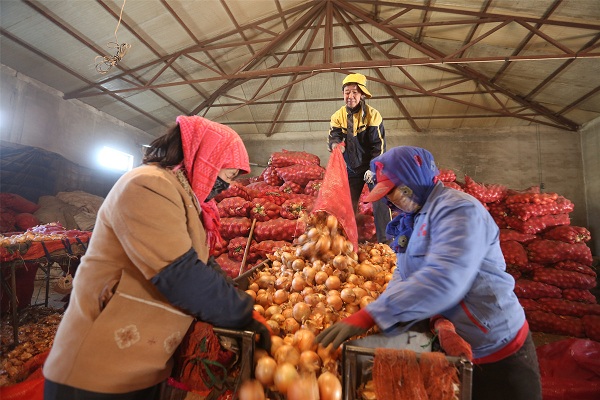Mongolia imports China's vegetables


Workers at a vegetable and oil import and export park at Erenhot, Inner Mongolia autonomous region, sift onions, one of the major products bought by Mongolian people. [Photo provided to China Daily]
At dusk, 32-year-old driver Bideryar from Mongolia drove his refrigerated truck to pick up vegetables in Erenhot, North China's Inner Mongolia autonomous region, the largest port along the China-Mongolia border. "Vegetables from China have brought more choices to our dinner table, and changed our eating habits," he said. "I mainly ate meat in the past, but now, I also eat vegetables imported from China. I am healthier."
Bideryar's sister is a vegetable wholesaler in Ulan Bator, capital of Mongolia. His sister usually sends the list of vegetables needed to the salesman in Erenhot via WeChat and will be notified when the vegetables are ready, upon which Bideryar will leave Ulan Bator for Erenhot.
With a population of about 3 million, Mongolia mainly relies on China for vegetables. "In Mongolia, some people have never even seen some of the vegetables from China, but more and more Mongolians are willing to try them," said Gyiya from Mongolia.
Ganerdeni, 37, has been a driver running between Ulan Bator and Erenhot for 17 years. "I work for many vegetable wholesalers, and the need for vegetables from China in Ulan Bator is far from being met," he said.
Every day, 10 to 20 refrigerated trucks will depart from Ulan Bator and return early in the morning two days later. The fresh vegetables from China will appear on supermarket shelves at night in Ulan Bator, he said.
"But five years ago, a two-way trip would take three to four days due to the shabby dirt road. But now, with a new road built, a one-way trip only takes eight hours," he said.
Additionally, customs time for fruits and vegetables was shortened last year and made a priority to speed up the process. "It takes only several minutes for a truck carrying fruits or vegetables to be cleared by customs," said Zhang Hongwei with Erenhot customs.
Haogang fruit and vegetable import and export company is the largest of its kind between China and Mongolia. It works with over 40 supermarkets and vegetable markets in Mongolia, and exports more than 100,000 metric tons of vegetables and fruits to Mongolia every year.
According to Erenhot customs, 69,000 tons of vegetables were exported in 2017, up 20.6 percent year-on-year.
"In the past, they just bought what we sold, mainly potatoes, onions and cabbages, but now, we sell what they order," said Zhao Long, 49, general manager of the company, who has been working in the trade for more than 20 years.
One of the purchase orders from Mongolia lists 51 kinds of vegetables, 19 kinds of fruits, six kinds of fungi and two spices. "Each listing also has a photo, so if we don't know what something is, the picture can help us figure it out," he said. "For example, we get celery from Shandong, cabbages from Fujian, and onions from Yunnan."
The company has built a base of more than 70 hectares in a village in Erenhot to plant products based on the orders from Mongolia. Other companies in Erenhot are also developing e-commerce to make it possible for customers in Mongolia to receive fresh vegetables they have ordered the same day.
MOST POPULAR
- 1 China to give visa-free treatment to another 9 countries
- 2 China fully opens manufacturing sector to foreign investors in landmark opening up move
- 3 China's import expo attracts record-breaking participating countries, exhibitors
- 4 China's door opening even wider to foreign visitors, businesses
- 5 China revises rules to ease foreign strategic investment in listed firms
Editors' Picks
 Infographic:
China's public holidays for 2025
Infographic:
China's public holidays for 2025
 Infographic:
Basic facts of APEC
Infographic:
Basic facts of APEC
 Infographic:
Wrapping up the 7th CIIE: Data recap
Infographic:
Wrapping up the 7th CIIE: Data recap




